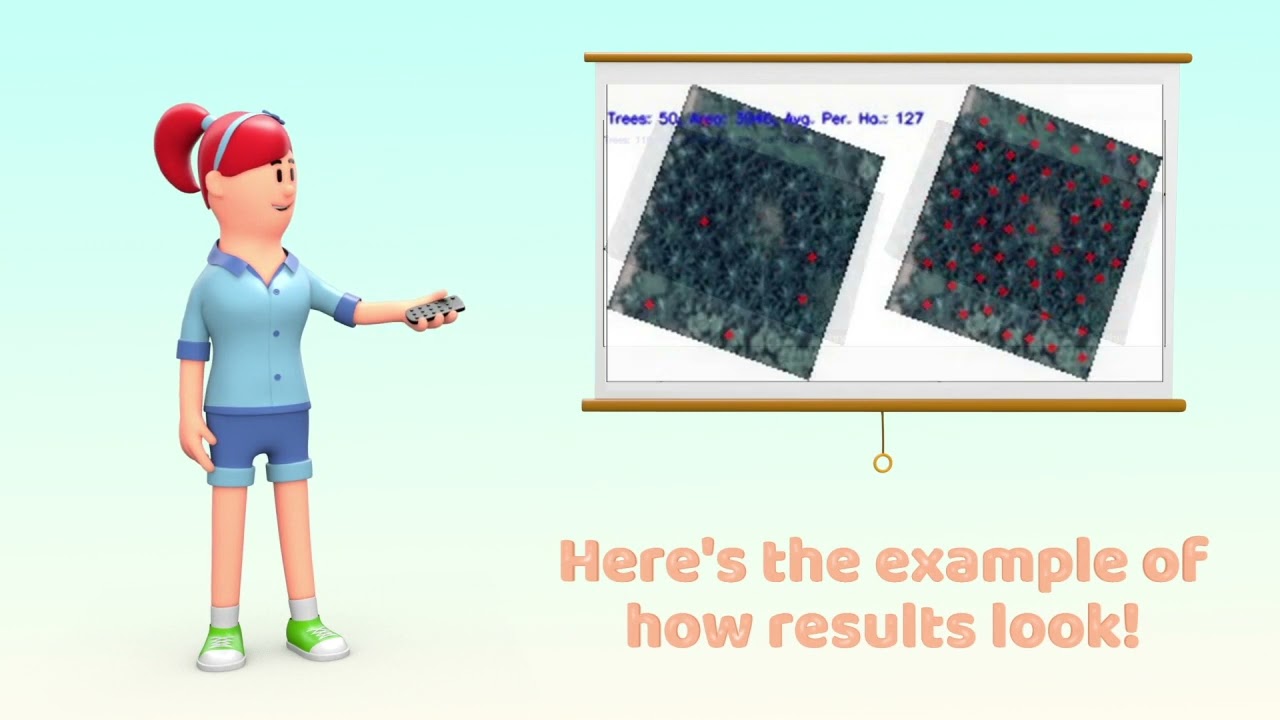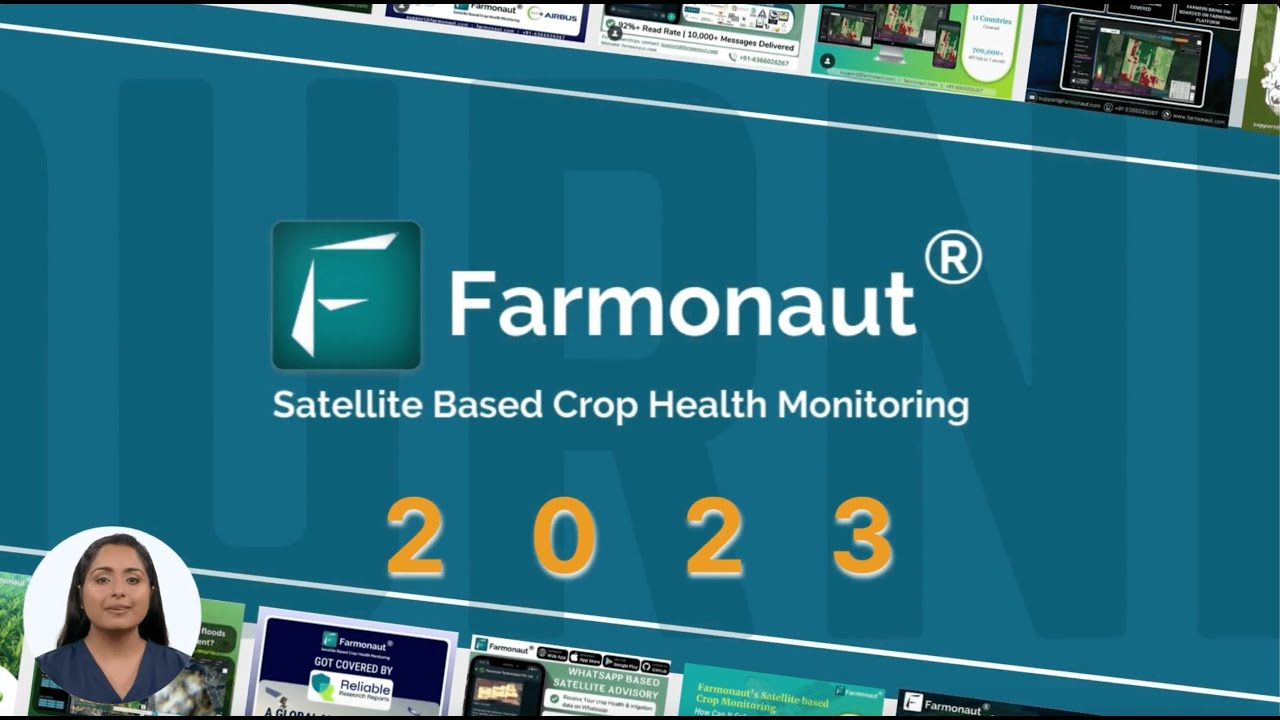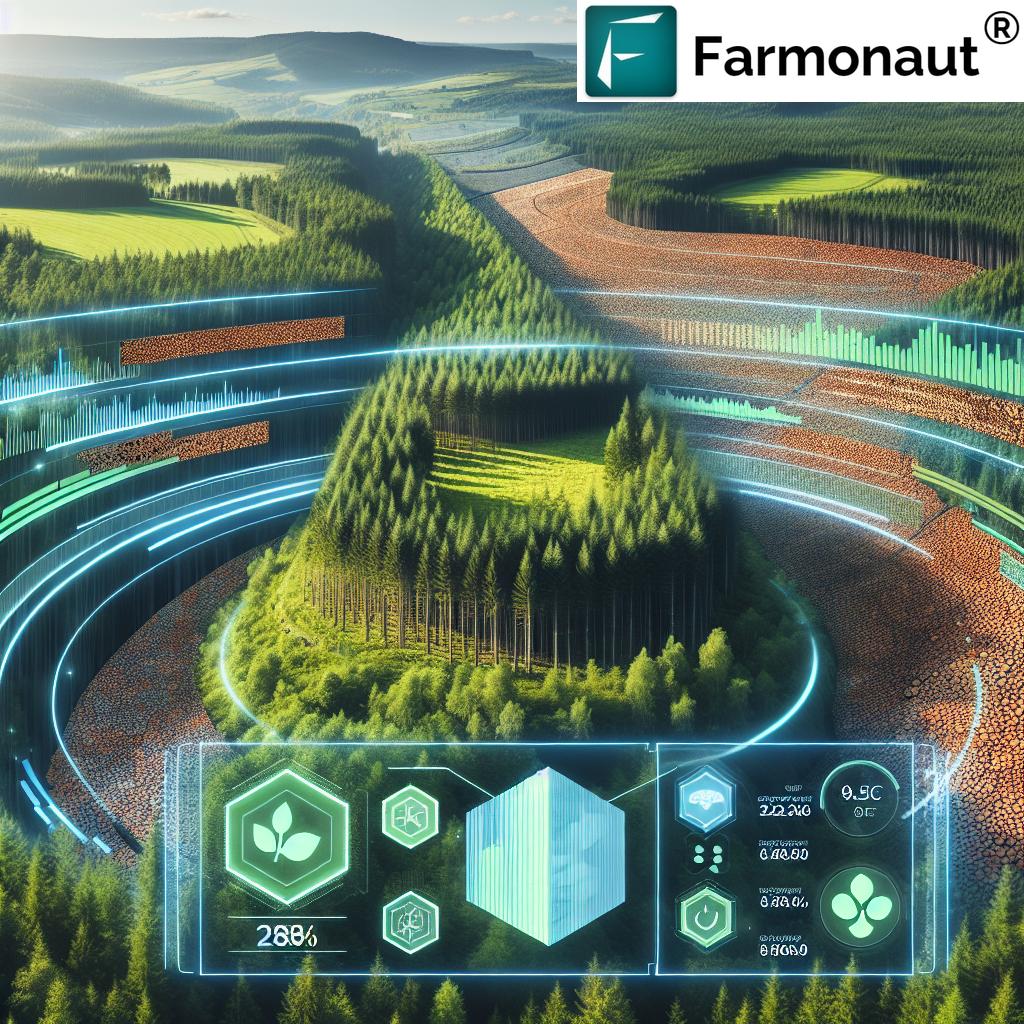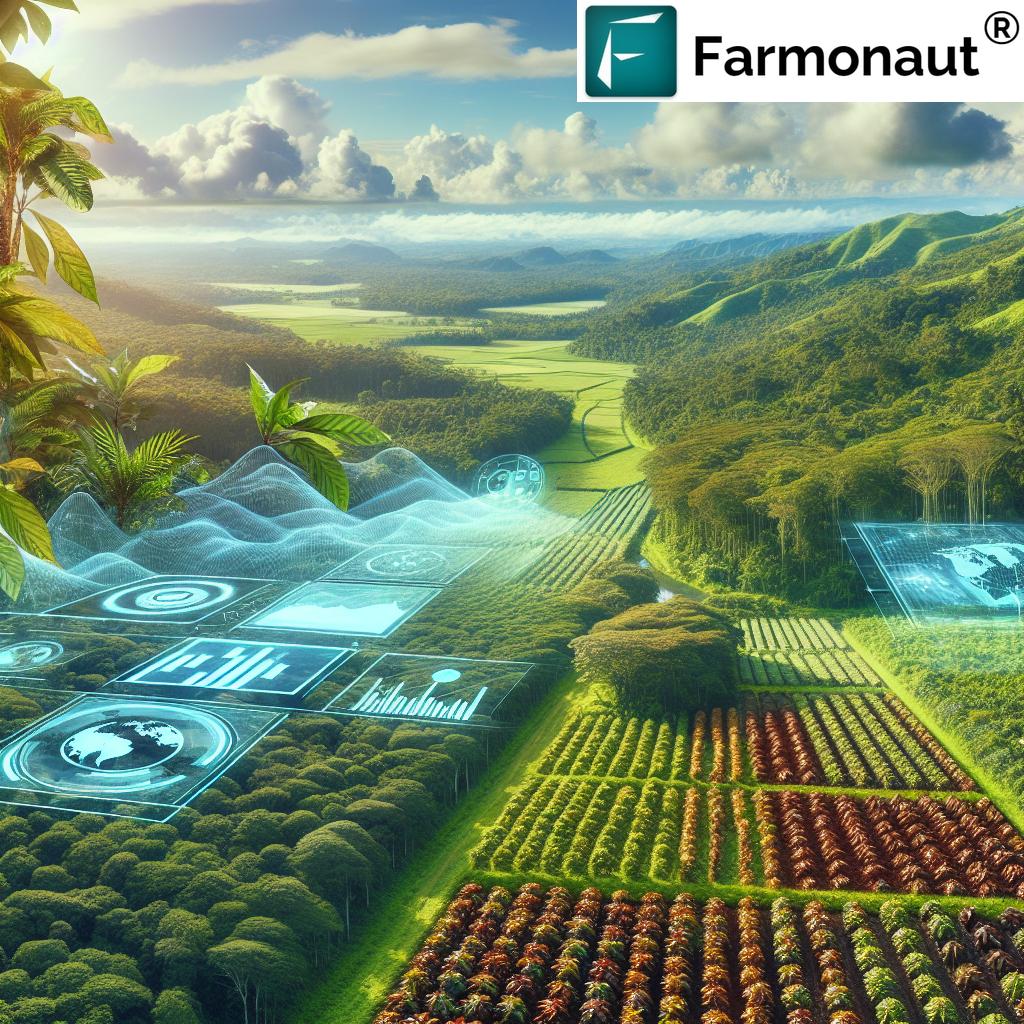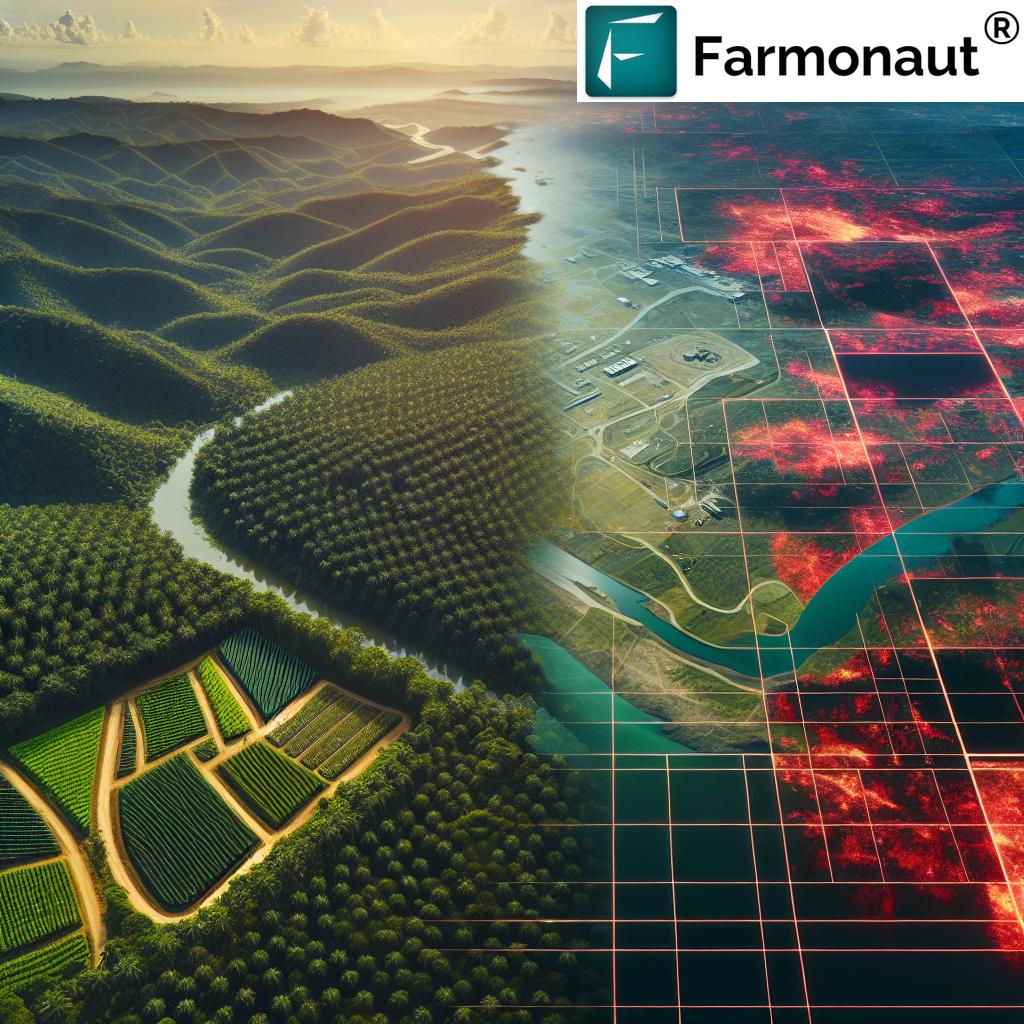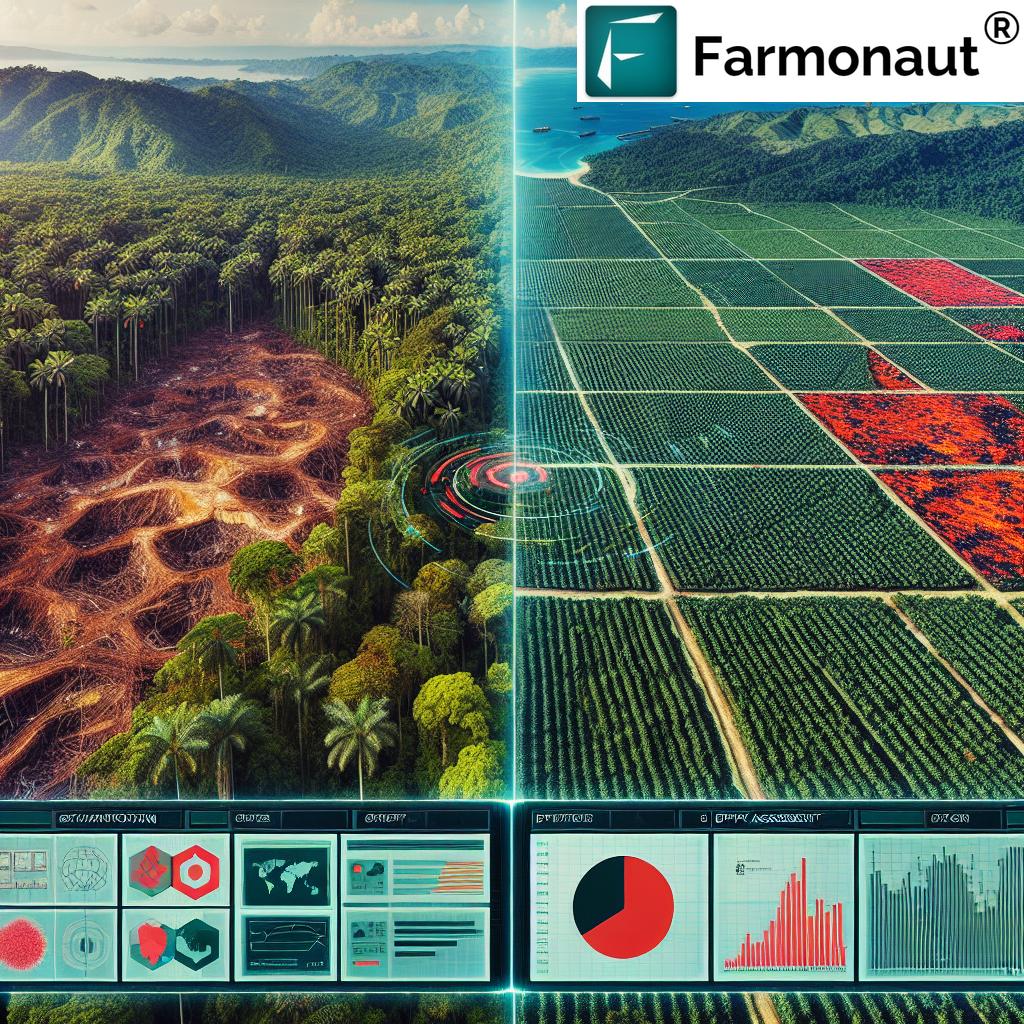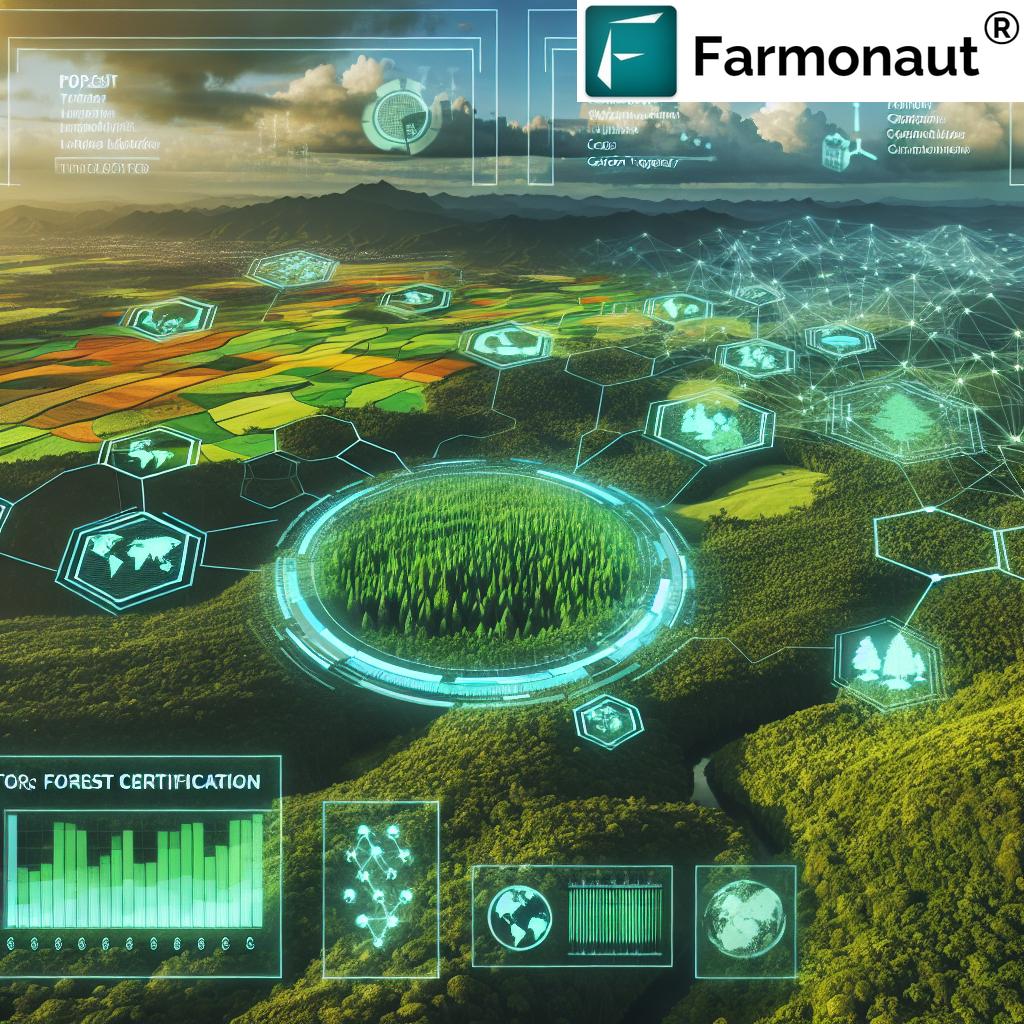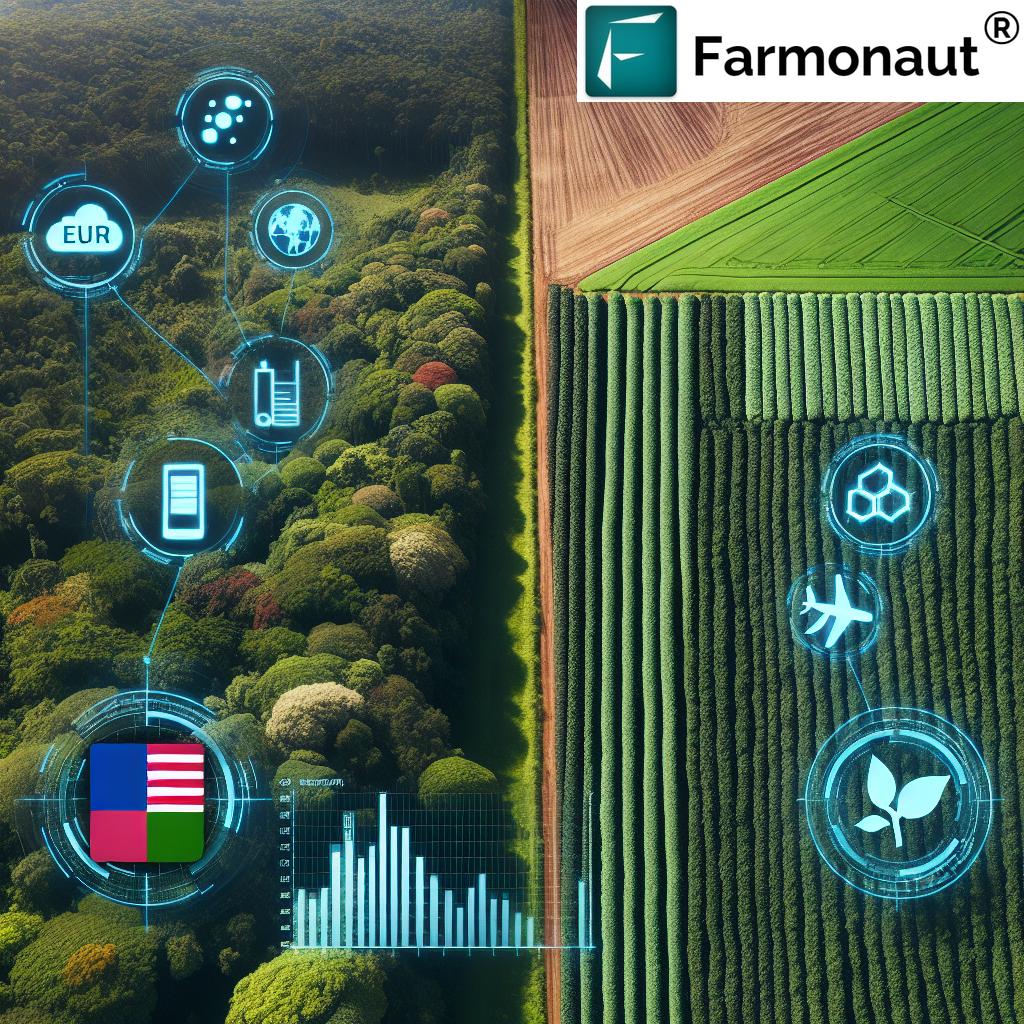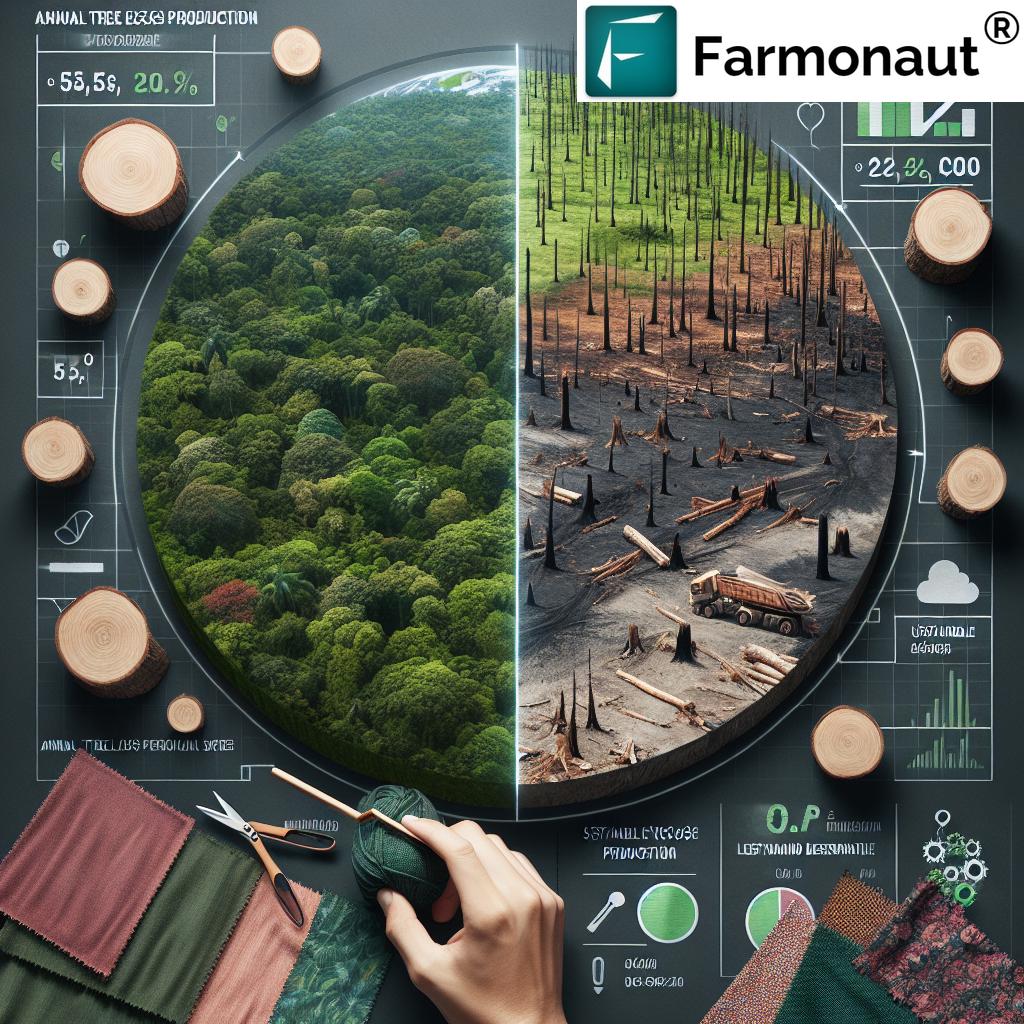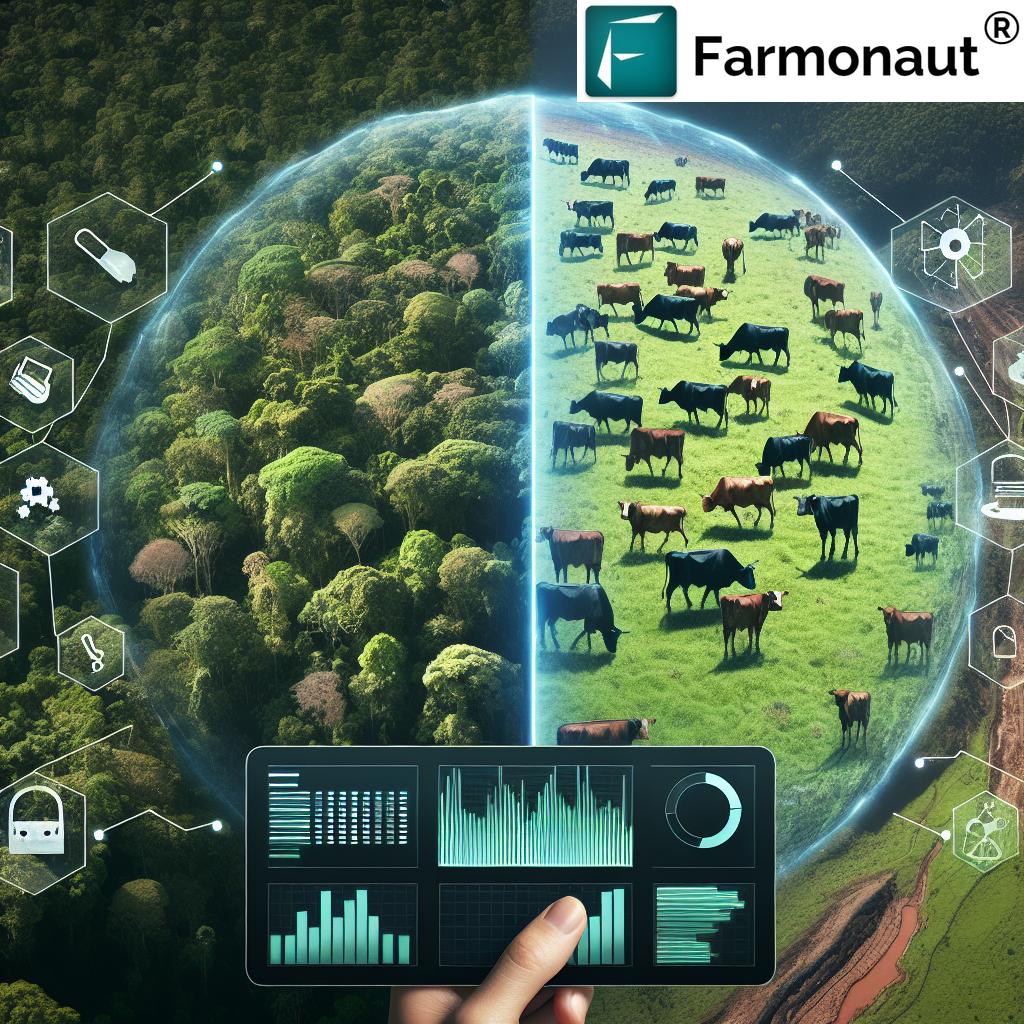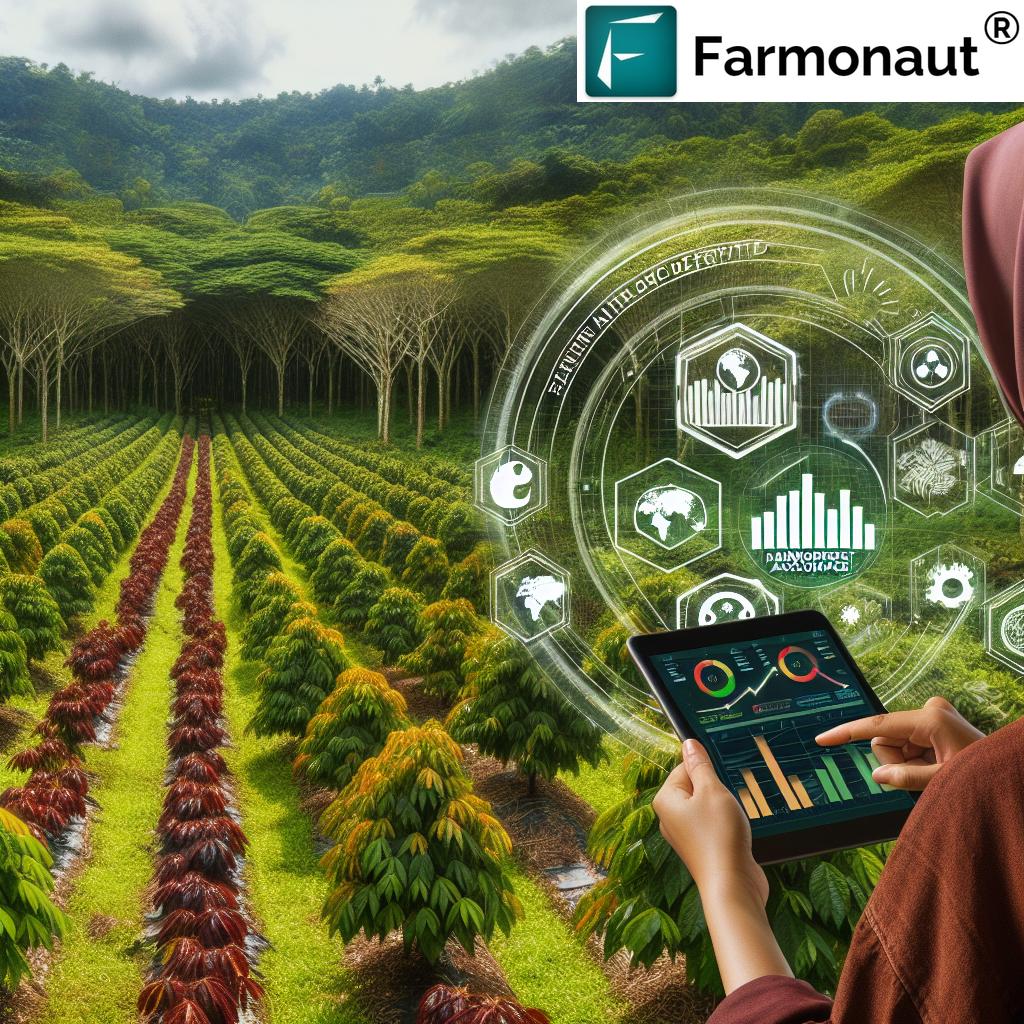Sustainable Palm Oil: Navigating Global Challenges in Deforestation Prevention and Supply Chain Traceability
“RSPO certification covers over 19% of global palm oil production, yet implementation challenges persist due to complex supply chains.”
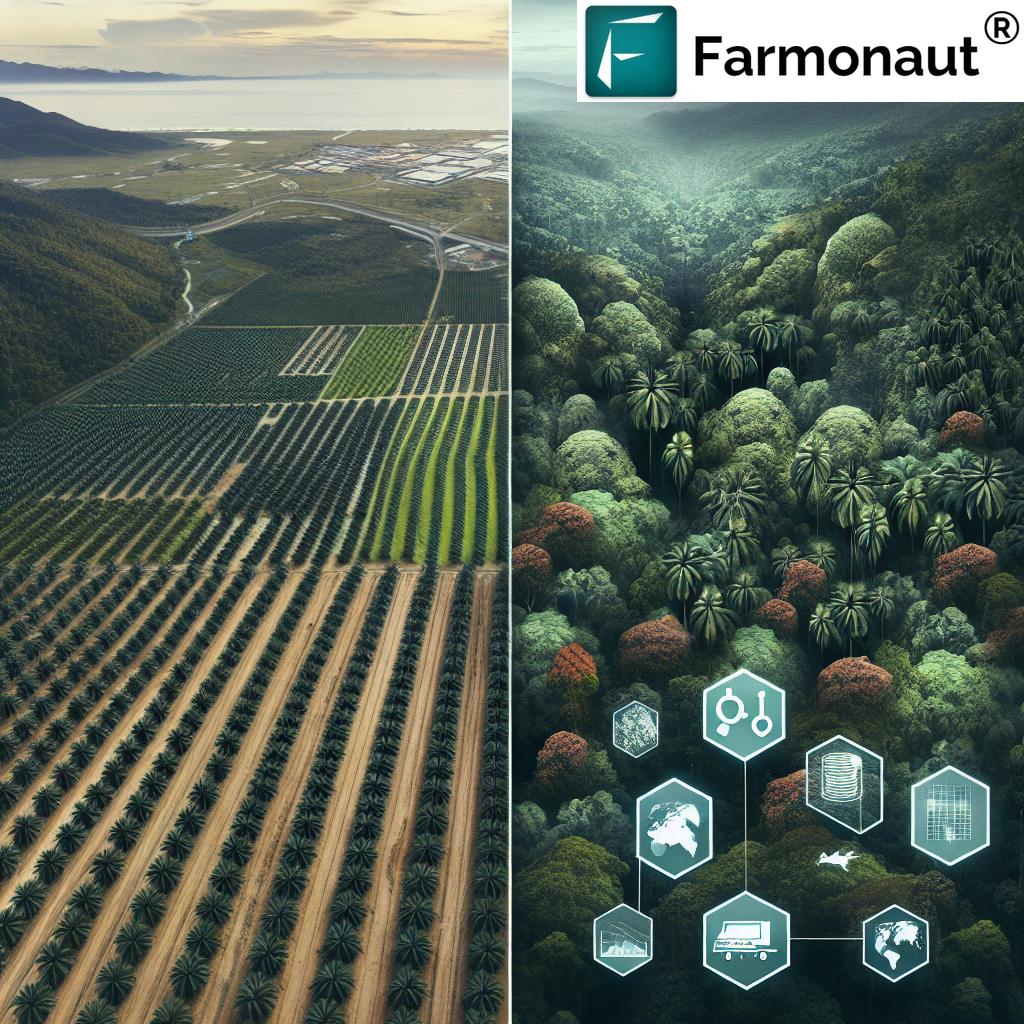
In the ever-evolving landscape of global agriculture, few topics have garnered as much attention and controversy as sustainable palm oil production. As we delve into this complex issue, we’ll explore the intricate challenges facing the industry, from deforestation prevention in the palm oil industry to ensuring palm oil supply chain traceability. Our journey will take us through the lush plantations of Indonesia, the bustling markets of Europe, and the innovative tech hubs where solutions like Farmonaut are changing the game.
The Palm Oil Paradox: Meeting Demand While Preserving Forests
Palm oil, derived from the fruit of oil palm trees, has become an ubiquitous ingredient in countless products we use daily. Its versatility and high yield per hectare have made it a favorite among producers and manufacturers alike. However, this high demand has led to significant challenges, particularly in terms of deforestation and sustainability.
- Global demand for palm oil continues to rise
- Deforestation remains a critical concern in major producing countries
- Balancing economic growth with environmental preservation is crucial
To address these challenges, various initiatives have emerged, with the Roundtable on Sustainable Palm Oil (RSPO) certification being one of the most prominent. The RSPO certification benefits include promoting sustainable practices, protecting biodiversity, and improving livelihoods for smallholder farmers. However, implementation remains a complex task due to the intricate nature of palm oil supply chains.
Tracing the Path: Supply Chain Complexities
One of the most significant hurdles in achieving truly sustainable palm oil production is the complexity of supply chains. From the sprawling plantations of Indonesia and Malaysia to the refined products on supermarket shelves, palm oil passes through numerous hands and processes. This complexity makes palm oil supply chain traceability a formidable challenge.
To tackle this issue, innovative solutions are emerging. Farmonaut, for instance, offers cutting-edge satellite-based monitoring tools that can help track and verify palm oil production at its source. By leveraging advanced technologies, we can create more transparent and accountable supply chains.
The Role of Technology in Sustainable Palm Oil Production
As we navigate the complexities of sustainable palm oil production, technology emerges as a powerful ally. Innovative solutions are revolutionizing how we monitor, manage, and trace palm oil from plantation to product. Let’s explore some of these groundbreaking technologies:
Satellite Monitoring: Eyes in the Sky
Satellite technology has become an indispensable tool in the fight against deforestation and in promoting sustainable agriculture practices. Companies like Farmonaut are at the forefront of this technological revolution, offering advanced satellite-based solutions for monitoring palm oil plantations.
- Real-time monitoring of plantation health and growth
- Early detection of deforestation activities
- Precise mapping of palm oil cultivation areas
By harnessing the power of satellite imagery and AI-driven analysis, we can now track changes in land use, identify illegal clearing, and assess the health of palm oil plantations with unprecedented accuracy. This technology not only aids in deforestation prevention in the palm oil industry but also helps optimize resource use, leading to more sustainable practices.
Blockchain: Ensuring Transparency and Traceability
Blockchain technology is emerging as a game-changer in ensuring palm oil supply chain traceability. By creating an immutable ledger of transactions, blockchain can track palm oil from the plantation to the end product, providing transparency at every step of the journey.
- Secure and transparent record-keeping
- Real-time tracking of palm oil shipments
- Verification of sustainable sourcing claims
Implementing blockchain in palm oil supply chains can significantly reduce the risk of fraud and enhance consumer trust. It allows buyers to verify the origin of their palm oil and ensure it comes from sustainable sources, thus supporting responsible sourcing strategies.
Explore Farmonaut’s API for advanced monitoring solutions
Supporting Smallholder Farmers: The Backbone of Sustainable Palm Oil
While technology plays a crucial role, the human element remains at the heart of sustainable palm oil production. Smallholder palm oil farmers support is essential for achieving long-term sustainability in the industry. These farmers, who often manage plots of less than 50 hectares, account for a significant portion of global palm oil production.
Supporting smallholders involves various strategies:
- Providing access to sustainable farming techniques and technologies
- Offering financial support and fair pricing mechanisms
- Facilitating certification processes to access premium markets
By empowering smallholder farmers with knowledge, resources, and market access, we can promote more sustainable practices at the grassroots level. This not only improves livelihoods but also contributes significantly to deforestation prevention and biodiversity conservation.
Sustainable Agriculture Practices in Palm Oil Production
Implementing sustainable agriculture practices is crucial for the long-term viability of palm oil production. These practices not only help in preventing deforestation but also contribute to improved soil health, biodiversity conservation, and increased yields. Let’s explore some key sustainable practices:
1. Precision Agriculture
Precision agriculture techniques, powered by technologies like those offered by Farmonaut, allow for more efficient use of resources:
- Optimized fertilizer application based on soil and plant needs
- Targeted pest management reducing chemical use
- Efficient water management through soil moisture monitoring
2. Integrated Pest Management (IPM)
IPM reduces reliance on chemical pesticides by:
- Using natural predators to control pest populations
- Implementing crop rotation and diversification
- Employing pheromone traps and other non-chemical control methods
3. Soil Conservation Techniques
Protecting and enhancing soil health is vital for sustainable palm oil production:
- Cover cropping to prevent soil erosion
- Minimal tillage practices to maintain soil structure
- Composting and organic matter management for nutrient cycling
By adopting these sustainable practices, palm oil producers can significantly reduce their environmental impact while potentially increasing their yields and profitability in the long term.
Check out Farmonaut’s API Developer Docs for integration possibilities
The Impact of EU Deforestation Regulation on Palm Oil Industry
“The EU Deforestation Regulation affects 14% of global palm oil imports, driving increased demand for traceable, sustainable sources.”
The EU Deforestation Regulation impact on the palm oil industry cannot be overstated. This landmark legislation aims to ensure that products sold in the EU market do not contribute to deforestation or forest degradation. For the palm oil sector, this means a significant shift towards more stringent traceability and sustainability requirements.
- Mandatory due diligence for palm oil importers
- Increased demand for certified sustainable palm oil
- Potential market access challenges for non-compliant producers
The regulation is driving innovation in palm oil sustainability monitoring tools, with companies like Farmonaut playing a crucial role in providing the necessary technological solutions. These tools enable producers and importers to verify and demonstrate compliance with EU requirements, ensuring continued access to this vital market.
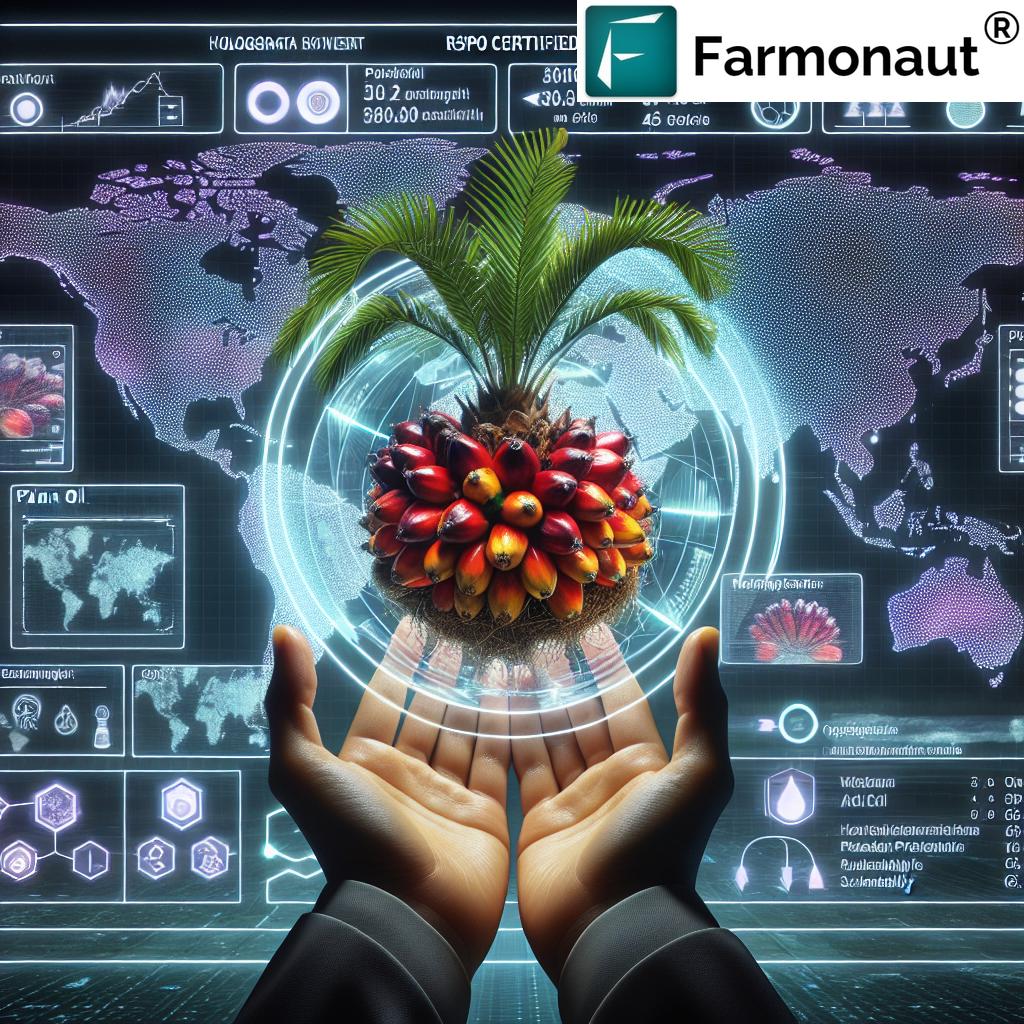
Global Palm Oil Market Trends: Navigating Sustainability Demands
Understanding global palm oil market trends is crucial for stakeholders aiming to navigate the complex landscape of sustainability and profitability. Several key trends are shaping the industry:
- Increasing demand for certified sustainable palm oil: Consumers and businesses are increasingly seeking products made with sustainably sourced palm oil, driving demand for RSPO and other certifications.
- Shift towards transparency: There’s a growing emphasis on supply chain transparency, with buyers demanding clear information about the origin and production methods of palm oil.
- Technological integration: The adoption of advanced technologies like satellite monitoring and blockchain for traceability is becoming more widespread.
- Focus on smallholder inclusion: Recognizing the importance of smallholders, there’s an increasing focus on programs that support and integrate these farmers into sustainable supply chains.
- Alternative markets development: As traditional markets like the EU implement stricter regulations, producers are exploring new markets in regions with growing demand for palm oil.
These trends highlight the need for adaptive strategies and innovative solutions in the palm oil industry. Companies that can effectively address sustainability concerns while meeting market demands are likely to thrive in this evolving landscape.
Sustainable Sourcing Strategies: A Path Forward
Implementing effective sustainable sourcing strategies is crucial for companies looking to secure a responsible and reliable palm oil supply. These strategies not only help in mitigating environmental and social risks but also contribute to long-term business resilience. Let’s explore some key approaches:
1. Direct Sourcing from Certified Producers
- Establish direct relationships with RSPO-certified plantations
- Implement long-term contracts to incentivize sustainable practices
- Invest in capacity building for suppliers to maintain and improve sustainability standards
2. Leveraging Technology for Traceability
- Utilize satellite monitoring tools like those offered by Farmonaut to track land use changes
- Implement blockchain solutions for end-to-end supply chain transparency
- Adopt digital platforms for real-time monitoring and reporting of sustainability metrics
3. Collaborative Industry Initiatives
- Participate in multi-stakeholder platforms to address industry-wide challenges
- Support landscape-level conservation initiatives in palm oil-producing regions
- Engage in pre-competitive collaboration to develop industry-wide sustainability solutions
4. Smallholder Inclusion Programs
- Develop programs to support smallholder farmers in achieving certification
- Provide access to technology and best practices for sustainable farming
- Create fair pricing mechanisms to ensure economic viability for smallholders
By implementing these strategies, companies can not only secure a more sustainable palm oil supply but also contribute to broader industry transformation towards sustainability.
The Role of Innovation in Sustainable Palm Oil Production
Innovation plays a pivotal role in addressing the challenges of sustainable palm oil production. From advanced monitoring technologies to novel agricultural practices, innovative solutions are helping to transform the industry. Let’s explore some key areas where innovation is making a significant impact:
1. Advanced Monitoring and Data Analytics
Companies like Farmonaut are at the forefront of developing sophisticated monitoring tools that leverage satellite imagery and AI-driven analytics. These technologies enable:
- Real-time monitoring of plantation health and productivity
- Early detection of deforestation or land-use changes
- Optimization of resource use through precision agriculture techniques
2. Genetic Research and Plant Breeding
Innovations in plant genetics are helping to develop palm oil varieties that:
- Have higher yields, reducing the need for expansion into new areas
- Are more resistant to pests and diseases, reducing chemical inputs
- Can thrive in diverse environmental conditions, promoting resilience
3. Sustainable Processing Technologies
Advancements in palm oil processing are focusing on:
- Reducing water and energy consumption in mills
- Developing value-added products from palm oil waste
- Implementing closed-loop systems for minimal environmental impact
These innovations not only contribute to sustainability but also often lead to improved efficiency and profitability for palm oil producers. By embracing these technological advancements, the industry can move closer to achieving its sustainability goals while meeting global demand.
Comparative Analysis: Traditional vs. Sustainable Palm Oil Practices
To better understand the impact of sustainable practices in palm oil production, let’s compare traditional methods with more sustainable approaches:
| Practice | Traditional Method | Sustainable Method | Environmental Impact | Economic Impact |
|---|---|---|---|---|
| Land Clearing | Slash and burn | Selective clearing, preserving high conservation value areas | Reduced CO2 emissions by up to 70% | Initial higher costs, long-term savings on restoration |
| Pest Management | Heavy use of chemical pesticides | Integrated Pest Management (IPM) | Reduced chemical runoff, improved biodiversity | 20-30% reduction in pest control costs |
| Fertilizer Use | Blanket application | Precision application based on soil analysis | Reduced nutrient runoff and soil degradation | Up to 25% increase in yield efficiency |
| Water Management | Flood irrigation | Drip irrigation and water recycling | 30-50% reduction in water usage | Improved drought resilience, reduced water costs |
| Monitoring | Manual field inspections | Satellite monitoring (e.g., Farmonaut solutions) | Early detection of deforestation, improved conservation | 15-20% improvement in overall plantation efficiency |
| Supply Chain | Limited traceability | Full traceability with blockchain technology | Reduced risk of sourcing from deforested areas | Access to premium markets, 10-15% price premium |
This comparison clearly illustrates the significant benefits of adopting sustainable practices in palm oil production, both for the environment and for long-term economic viability.
The Future of Sustainable Palm Oil: Challenges and Opportunities
As we look towards the future of sustainable palm oil production, we see a landscape filled with both challenges and opportunities. The industry stands at a crucial juncture, where the decisions made today will shape its trajectory for years to come.
Challenges:
- Balancing demand and sustainability: Meeting growing global demand while adhering to strict sustainability standards
- Climate change impacts: Adapting to changing weather patterns and increased risk of extreme events
- Market fragmentation: Navigating differing sustainability requirements across global markets
- Smallholder integration: Ensuring smallholders can meet sustainability standards without being left behind
Opportunities:
- Technological advancements: Leveraging innovations like Farmonaut’s satellite monitoring for improved sustainability and efficiency
- Emerging markets for sustainable products: Tapping into growing consumer demand for sustainably sourced goods
- Carbon market potential: Exploring opportunities in carbon sequestration and emissions reduction
- Biodiversity conservation: Developing models that combine palm oil production with ecosystem preservation
The path forward for sustainable palm oil will require concerted efforts from all stakeholders – producers, governments, NGOs, and technology providers. By embracing innovation, fostering collaboration, and maintaining a commitment to sustainability, the palm oil industry can transform challenges into opportunities for positive change.
Conclusion: A Collaborative Path to Sustainable Palm Oil
As we’ve explored throughout this blog, the journey towards truly sustainable palm oil production is complex and multifaceted. It requires a delicate balance of environmental stewardship, economic viability, and social responsibility. The challenges are significant, but so too are the opportunities for positive change.
Key takeaways from our exploration include:
- The critical role of technology, such as Farmonaut’s satellite monitoring solutions, in enhancing transparency and sustainability
- The importance of supporting smallholder farmers in adopting sustainable practices
- The impact of regulations like the EU Deforestation Regulation in shaping market dynamics
- The potential of innovative approaches in areas like precision agriculture and supply chain traceability
As we move forward, collaboration will be key. No single entity – whether it’s a producer, technology provider, or regulatory body – can solve these challenges alone. It will take a concerted effort from all stakeholders to create a truly sustainable palm oil industry.
By embracing innovation, fostering transparency, and maintaining a steadfast commitment to sustainability, we can navigate the complex challenges of palm oil production. In doing so, we can work towards a future where palm oil meets global demand while preserving our precious forests and supporting the livelihoods of millions.
The path may be challenging, but with continued dedication and collaborative effort, a sustainable future for palm oil is within our reach.
Frequently Asked Questions (FAQ)
- What is sustainable palm oil?
Sustainable palm oil is produced in a way that minimizes negative environmental impacts, preserves biodiversity, and respects the rights of workers and local communities. - How does RSPO certification benefit palm oil producers?
RSPO certification provides access to premium markets, improves operational efficiency, and enhances brand reputation for palm oil producers. - What role does technology play in sustainable palm oil production?
Technology, such as Farmonaut’s satellite monitoring tools, plays a crucial role in improving traceability, optimizing resource use, and preventing deforestation in palm oil production. - How does the EU Deforestation Regulation affect the palm oil industry?
The EU Deforestation Regulation requires palm oil importers to prove their products are deforestation-free, driving demand for traceable and sustainable sources. - What are some sustainable agriculture practices in palm oil production?
Sustainable practices include integrated pest management, precision agriculture, soil conservation techniques, and responsible water management. - How can smallholder farmers be supported in adopting sustainable practices?
Smallholders can be supported through access to training, technology, finance, and fair pricing mechanisms to enable their transition to sustainable practices. - What are the main challenges in achieving palm oil supply chain traceability?
Main challenges include complex supply networks, lack of standardized tracking systems, and the involvement of numerous intermediaries in the supply chain. - How does sustainable palm oil production contribute to deforestation prevention?
Sustainable production practices, including satellite monitoring and strict land-use policies, help prevent expansion into forested areas and promote responsible land management. - What are some emerging trends in the global palm oil market?
Emerging trends include increased demand for certified sustainable palm oil, greater emphasis on supply chain transparency, and the adoption of innovative technologies for monitoring and traceability. - How can consumers contribute to promoting sustainable palm oil?
Consumers can contribute by choosing products with RSPO or other sustainability certifications, supporting brands committed to sustainable sourcing, and advocating for greater transparency in palm oil supply chains.



